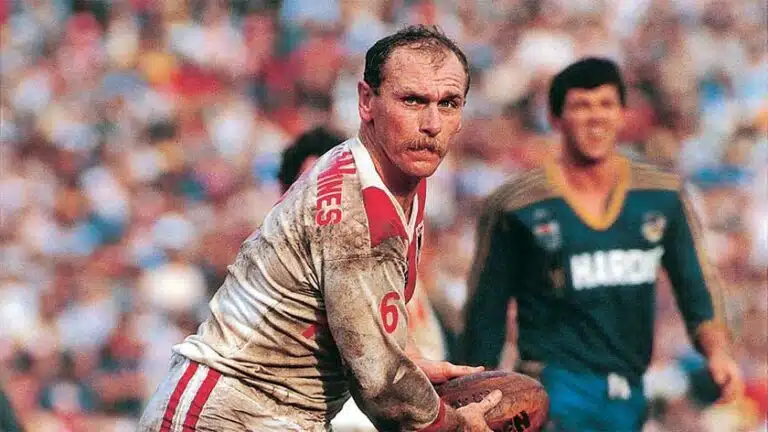Steve Rogers | Alcohol & Antidepressant Overdose Death
- About Steve Rogers
- How Steve Rogers Died
- Steve Roger’s History Of Substance Abuse
- Did Steve Rogers Attend Rehab?
- Recovery Is Possible

On January 3, 2006, former Australian rugby player Steve Rogers was found dead in his Cronulla, New South Wales, Australia home. The official cause of death was ruled a heart attack due to Rogers swallowing a combination of prescription drugs and alcohol.
Before his death, Rogers was a renowned, accomplished player in the Australian rugby leagues, earning numerous accomplishments with the Cronulla Sharks and St. George Dragons.
His peers and fans considered him one of the greatest players of the 1970s, with former teammate Rod Reddy calling Rogers the most complete player of his time.
Outside of rugby, Rogers privately struggled with his mental health and personal tragedies. An overdose on prescription antidepressants would factor into his untimely death.
About Steve Rogers
Born on November 20, 1954 in Sydney, NSW (New South Wales) on the Gold Coast, a young Rogers would play his first of many professional rugby seasons at the age of 17.
Rogers’ professional rugby accomplishments included scoring 10 goals in a single game, which stands as the Cronulla Sharks record. He also set the Sharks record for points scoring at 1281, which would not be broken until his son Mat surpassed him in 2001.
Rogers led Cronulla to a grand finals appearance in 1973 and 1978, although he did not win a premiership title during his playing career. He also served as captain of the Australia National Team in 1981, during one of three Kangaroo Tours appearances.
After his playing career, Rogers served as the chief executive and general manager of his former Cronulla club until his passing in 2006. He was posthumously inducted into the National Rugby League Hall of Fame in 2008.
How Steve Rogers Died
On the morning of January 3, 2006, a 51-year-old Steve Rogers had just returned to his Cronulla home from a vacation. Accounts from news reports state that his body was found by his brother-in-law that morning.
The official cause of death was a heart attack due to a mix of antidepressant medication and alcohol in Rogers’ system.
Cronulla football manager Greg Pierce described Rogers’ death as a shock, a sentiment mirrored by Rogers’ coworkers, fans, friends, and family. Though Rogers struggled with depression throughout his life, his death was not ruled a suicide.
Aftermath
Rogers was survived by his wife Ingrid and his children Mat, Don, and Melanie. His son Mat Rogers went on to become a successful professional Cronulla club and rugby union player in his own right.
In an interview with A Current Affair, Mat Rogers emphasized the importance of professional athletes seeking help for physical and mental health while opening up about the struggles he faced in his own life.
Steve Roger’s History Of Substance Abuse
Alcohol and prescription antidepressants were found in Rogers’ system at the time of his death. He also struggled with depression, which his son Mat discussed in interviews after his death.
However, few accounts exist concerning Rogers’ history of alcohol or prescription drug abuse.
Rogers’ son Mat stated in interviews that his father’s depression was a private matter. He added that famous figures may face obstacles in seeking help due to the surrounding stigma.
Did Steve Rogers Attend Rehab?
Similar to the lack of evidence regarding Steve Rogers’ substance abuse, it’s difficult to determine whether he sought help for his mental health conditions. Steve Rogers faced many personal tragedies, including the losses of his parents and first wife, Carol, to cancer.
Recovery Is Possible
Steve Rogers’ difficulties in coping with his mental health struggles may have led to his eventual passing. Despite his accomplishments and fame, Rogers may have been able to benefit from professional help.
Substance abuse can affect people of all financial and social standings. Professional addiction treatment programs can offer personalized plans for a wide variety of patients to make recovery possible in the long-term.
To learn how we address mental health and addiction, please contact us today.
Written by Ark Behavioral Health Editorial Team
©2024 Ark National Holdings, LLC. | All Rights Reserved.
This page does not provide medical advice.
9now - Footy legend Mat Rogers opens up about health scare and loss of father, friends to suicide
League Unlimited - Steve Rogers passes away, aged 51 » League Unlimited
National Rugby League Hall of Fame - Steve Rogers - National Rugby League Hall Of Fame
The Sydney Morning Herald - Steve Rogers found dead

Questions About Treatment?
Ark Behavioral Health offers 100% confidential substance abuse assessment and treatment placement tailored to your individual needs. Achieve long-term recovery.
100% confidential. We respect your privacy.
Prefer Texting?
Our friendly support team is here to chat 24/7. Opt out any time.







 Learn More
Learn More








